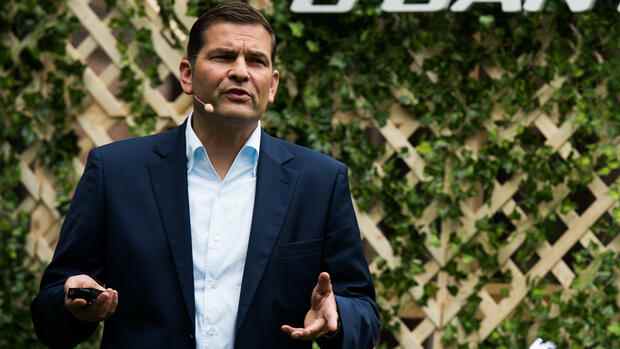Stuttgart, Munich After a search lasting more than six months, Knorr- Bremse has found a new CEO. Marc Llistosella will lead the Munich MDax group as of January 1st. Llistosella was active until recently as an investor and founder, including in the start-ups Vaionic and Einride, each of which develops electric drives for commercial vehicles. The 55-year-old was CEO of the Mitsubishi Fuso Truck & Bus Corporation until 2018 and head of the Daimler truck business in Asia.
Chairman of the Supervisory Board Reinhard Ploss called Llistosella an “impressive leader with an excellent reputation and many years of management experience” who will “bring Knorr Bremse back to its former strengths”.
The search for a new boss was necessary after Jan Mrosik left the company at the end of March. It was the third departure from a CEO in three years: In 2019, the Supervisory Board fired long-time boss Klaus Deller, who had previously successfully taken Knorr- Bremse public. His successor Bernd Eulitz, poached by the Munich neighbor Linde, also only stayed a year.
The then major shareholder Heinz Hermann Thiele complained that Eulitz paid too little attention to the operative business. The company patriarch had himself re-elected to the supervisory board because he did not agree with the development of his life’s work and the work of his successors. He didn’t achieve much: In March 2021, the multi-entrepreneur died at the age of 79.
Top jobs of the day
Find the best jobs now and
be notified by email.
Llistosella is the fourth boss in four years
Thiele had pushed through Jan Mrosik’s commitment. The digital expert from Siemens was supposed to make the two group divisions Truck Brakes (CVS) and Rail Vehicles (RVS) fit for autonomous driving. He had no prior knowledge of the truck or train business. This also immediately led to conflicts with the powerful truck boss Peter Laier.
>> Read also: The next boss for Mahle – Franz follows Frick, who is moving to ZF
Mrosik sought salvation in a spectacular deal and attempted to take over the light and sensor specialist Hella. With Hella, Knorr would have made up ground against the three major truck suppliers Bosch, Conti and, above all, ZF Friedrichshafen. But the deal fell through, also because Mrosik had not sufficiently involved the capital market.
Above all, the botched Hella deal left Knorr in tatters, the share price collapsed by more than 20 percent, and investors and parts of the management team were upset. At the end of October 2021, truck boss Peter Laier finally announced his early departure at the end of the year – and switched to his big rival ZF of all places.
In the industry, the CEO job is not only considered an ejection seat because of the frequent changes. “The management structure is problematic. The CEO does not run any operational business himself, and the heads of the two largely independent group divisions truck and rail do not allow themselves to be talked into it,” explains a headhunter who is well wired in the industry.
The separation from Mrosik took place “on the best of terms”, explained Klaus Mangold, who was the head of the supervisory board at the time. Reinhard Ploss then took over the control committee at the general meeting in May. But the former Infineon boss had neither led a supervisory board nor did he have sufficient contacts in the supplier industry. At best, he knew the industry as a customer of Infineon’s autochips, but not its peculiarities. CFO Frank Markus Weber, brought in from Daimler, temporarily took over the position of board spokesman.
The appointment of Marc Llistosella is now the first important test for Reinhard Ploss.
China is becoming a cluster risk for Knorr
Operationally, Knorr- Bremse remains a construction site. With sales of 6.1 billion euros, the group makes good money with brakes, doors and air conditioning systems for trains. And in the truck business, the margins are better than those of the competition. In the first half of the year, the EBIT stood at 10.1 percent with an increasing order intake.
But the risks are also growing at Knorr: China is the largest single market in the rail business, and the corona lockdowns and the country’s increasing decoupling are becoming a risk for Knorr.
The wind is also getting rougher in the truck business. Knorr, previously the world market leader for truck brakes, is facing ever greater rivals. With the takeover of Wabco in 2020, ZF secured Knorr’s biggest competitor and can now offer steering, chassis and now also brakes together.
>> Read also: Why so many automotive suppliers are looking for a new boss
The story could have gone differently. ZF and Thiele had repeatedly negotiated a merger over the past decade – but the then Knorr major shareholder did not want to subordinate his company to the ZF managers. Instead, Knorr eventually went public and ZF snapped up Wabco. With that, the German royal solution is off the table once and for all.
The long-term future of the world market leader for truck and train brakes is not yet secured even with the IPO. Thiele inherited the approximately 59 percent stake in the company to his wife Nadia and his daughter from his first marriage, Julia. Actually, however, the shares should go to a foundation – which, however, is still not there almost a year and a half after Thiele’s death. With Marc Llistosella, at least the board now has a boss again.
More: Who is the largest supplier? Two German companies are fighting over the world leadership in commercial vehicles

